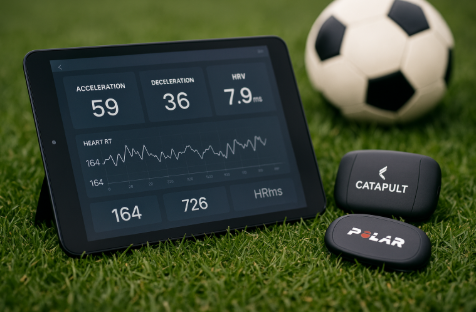 Football has changed from being driven solely by instinct and emotion to being driven by information and instinct.
Football has changed from being driven solely by instinct and emotion to being driven by information and instinct.
Throughout Europe and other regions, top clubs are applying data analysis to every aspect of the game. From strategy and talent development to every other aspect of the game, the role of creativity and emotion remains. Data and analytics direct every aspect from player recruitment to recovery. Data-driven technologies define how the modern game is played.
How Data Drives Tactical Intelligence
Football strategy now depends on measurable insight. Liverpool, Brentford, and FC Midtjylland have begun tracking player positioning, passing, and team structure through the use of analytical models. This tangible way of tracking performance has transformed coaching and recruitment across various leagues.
Amid this evolution, online betting platforms are adopting similar data logic. MelBet login gives users access to live odds, updated statistics, and match insights in real time, helping them make informed betting choices with accuracy and transparency. Its dashboard is easy to use, the data is real, and the payouts are super fast. That is why it is a trusted space for people who love sports and value accuracy just as much as thrill. It bridges the analytical mindset of clubs with the passion of their supporters.
Integrating predictive modeling with data tracking helps coaches see patterns that might otherwise be missed during live play. Analytics departments can now recommend formation adjustments, manage player fatigue, and identify tactical weaknesses with scientific accuracy. Football’s future is no longer just played — it’s calculated.
Key analytical tools shaping football strategy:
- GPS trackers monitor movement and sprint data
- xG (Expected Goals) metrics evaluate scoring probability
- AI-powered video systems for tactical visualization
- Heatmaps displaying player positioning and spacing
In combination, these technologies provide the foundation upon which contemporary tactical design rests.
To complement this ecosystem, data-driven gaming platforms integrate sports and entertainment. Within this context, fans engage with secure systems that mirror football’s analytical precision. In this environment, Betika registration connects users to casino gaming and virtual sports through a single interface. The platform features fast transactions, reliable gameplay, and verified fairness, offering a safe and dynamic casino experience enhanced by smart technology. The seamless navigation experience, personalized rewards, and ongoing transparency are exceptional responsible entertainment.
Measuring Fitness, Recovery, and Performance Longevity
As football becomes more data-centric, long-term sustainability depends on clear ethical and operational principles. Clubs and federations are now focusing on building secure, transparent systems that protect both players and data integrity. These guidelines define how technology should support the game — responsibly and with accountability.
Core principles shaping the next decade:
- Responsible data collection and storage
- Player consent and privacy safeguards
- Transparent AI use in match decisions
- Balance between innovation and human judgment
Wearable technologies and bio-analytics keep changing the ways football clubs track and safeguard their players. An anticipated 2024 Journal of Big Data publication notes that clubs use AI to predict match results and assess player workload – striking a balance between physical performance and tactical objectives. Catapult, STATSports, and Polar Track technologies track real-time metrics of player movements and cardio-vascular assessments, including acceleration, deceleration, and heart-rate variability. Performance teams gain the insights necessary to adjust training paradigms. Medical reviews recognize the value of Player Load monitoring to control the intensity of work to reduce the risk of injuries attributable to fatigue.
Data-Driven Recovery and Performance Management
In addition, wearable sensors are now able to track biomechanical angles and monitor muscle symmetry, assisting in diagnosing possible muscle imbalances prior to injuries. In the publication, Frontiers in Sports and Active Living, research suggests that AI monitoring, combined with clear and honest data policies, improves the safety of athletes and helps coaches make more precise decisions. This movement of data–based performance management is no longer restricted to professional clubs, but also to national federations and youth academies.
Key Applications of Data Analytics in Football:
| Focus Area | Example of Use | Real-World Application |
| Tactical Strategy | AI-driven match modeling | Liverpool’s xG and pressing data |
| Recruitment | Predictive scouting models | Brentford’s player analytics |
| Injury Prevention | Wearable sensor tracking | Manchester City’s load management |
| Fan Engagement | Live data integration | Real-time match dashboards |
The data summarized above highlights how analytics now touches every layer of football operations. From the training ground to the executive boardroom, performance metrics influence recruitment, medical routines, and fan experience. This interconnected approach is setting new industry standards, showing that data is no longer an accessory but a vital part of modern football strategy.
Ethics, Transparency, and the Future of AI in Football
The rise of football data brings both innovation and responsibility. Questions around ownership, privacy, and ethical use continue to shape how clubs collect and manage information. FIFA and UEFA are developing frameworks to promote transparency and ensure fairness in AI-driven decision-making.
To ensure fairness and accountability, FIFA and UEFA have outlined several long-term standards for ethical data use. These include responsible storage of performance data, obtaining player consent, and applying AI tools transparently during officiating or decision-making processes. Such measures aim to balance innovation with human oversight while protecting player rights and maintaining the integrity of competition.





